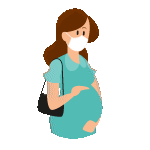A missed period is one of the early symptoms of pregnancy and the most common sign that women see before confirmation. Other symptoms gradually appear as your hormones change during the baby's development inside you.
However, a missed period doesn’t always mean you are pregnant, and that’s why getting a second confirmation is important. Some people choose to visit a doctor, while others take a home test to confirm their pregnancy. Significant hormonal changes take place during pregnancy, which can trigger multiple symptoms.
Some women may experience various mild-to-severe symptoms, while others may have only a few.
In this guide, we'll explore common pregnancy symptoms, their implications, and when to consult your healthcare provider for peace of mind.
Morning Sickness
Morning sickness, followed by nausea and vomiting, is one of the most well-known pregnancy symptoms. While it's often referred to as "morning" sickness, it can occur at any time of the day. For many women, morning sickness is a normal part of pregnancy, typically peaking during the first trimester and gradually improving as the pregnancy progresses.
However, severe or persistent nausea and vomiting, accompanied by dehydration or weight loss, may indicate a condition called hyperemesis gravidarum, which requires medical attention.
Breast Changes
A change in the breast is one of the first noticeable signs of pregnancy, as your breast may begin to feel tender, swollen, and generally heavy or full. Along with the change in breasts, your nipples may also become larger and more sensitive.
Fatigue
Fatigue is another common symptom experienced by many pregnant women, especially during the first and third trimesters. The body undergoes significant changes during pregnancy, including hormonal fluctuations and increased blood volume, which can contribute to feelings of exhaustion.
While fatigue is often considered a normal part of pregnancy, excessive or debilitating fatigue may indicate underlying issues such as anemia or thyroid dysfunction, necessitating evaluation by a healthcare provider.
Food Cravings
Food cravings are common during pregnancy, especially for food products that provide energy and calcium, such as milk and other dairy products. You may also experience a sudden distaste for foods you previously liked.
Some women also develop an unusual taste for non-food items, which is called pica, and it indicates nutrient deficiency. Consult your doctor in such a case.
Bleeding and Spotting
Bleeding or spotting during pregnancy can be alarming for expectant mothers, as it may signal underlying issues such as miscarriage or ectopic pregnancy.
While some light spotting is relatively common, especially during the first trimester, persistent or heavy bleeding, particularly accompanied by abdominal pain or cramping, warrants immediate medical attention.
Your healthcare provider can evaluate and determine the cause of the bleeding and provide appropriate management.
Swelling and Discomfort
As the body adapts to accommodate the growing baby, pregnant women may experience various aches and pains, including swelling, back pain, and pelvic discomfort.
While mild swelling and discomfort are typical pregnancy symptoms, especially in the later stages, severe or sudden swelling, particularly in the hands, face, or legs, could be a sign of preeclampsia, a serious condition that requires immediate medical attention.
Additionally, persistent or severe back pain may indicate musculoskeletal issues or other underlying concerns that warrant evaluation by a healthcare provider.
Fetal Movement
Feeling your baby's movements, known as "quickening," is an exciting milestone in pregnancy. While fetal movement patterns vary from one pregnancy to another, most expectant mothers begin to feel their baby's kicks and flutters between 18 and 25 weeks of gestation.
Regular fetal movements are generally a reassuring sign of fetal well-being. However, a decrease in fetal movement or a sudden change in movement patterns should prompt immediate medical evaluation to ensure the baby's health and well-being.
Varicose Veins
Varicose veins are very common in pregnancy due to a lot of factors, like an increased volume of circulating blood, the pressure of the pregnant uterus, and more. The increased pressure on the veins can also result in swelling, followed by cramps and heaviness.
If you think you are pregnant, you should not rely on signs and symptoms for confirmation. Taking a home pregnancy test or consulting your doctor. Many of the early pregnancy signs can be considered premenstrual syndrome. A wide range of changes can happen in your body in the different stages of pregnancy, including backaches, headaches, constipation, mood swings, and more.
FAQ's
Q. What are the earliest signs of pregnancy?
Ans. The earliest signs of pregnancy include a missed period, nausea (morning sickness), breast tenderness, fatigue, and frequent urination. However, these symptoms can vary from person to person. You can confirm and track your pregnancy stage using the Pregnancy Calculator.
Q. Is morning sickness normal, and when should I be concerned?
Ans. Morning sickness, characterized by nausea and vomiting, is common in early pregnancy. It usually subsides after the first trimester. However, severe nausea and vomiting leading to dehydration and weight loss may indicate hyperemesis gravidarum, requiring medical attention.
Q. Why do breasts change during pregnancy?
Ans. During pregnancy, hormonal changes cause the breasts to become tender, swollen, and fuller. Nipples may also darken and become more sensitive due to increased blood flow and milk duct preparation.
Q. Why do I feel extremely tired during pregnancy?
Ans. Fatigue is a common symptom due to hormonal changes, increased blood volume, and metabolic demands. It is most noticeable in the first and third trimesters. However, excessive fatigue could indicate anemia or thyroid issues, requiring a doctor’s evaluation.
Q. Are food cravings and aversions a normal part of pregnancy?
Ans. Yes, pregnancy cravings and aversions are common due to hormonal changes. Some women may crave nutrient-rich foods, while others experience an aversion to certain smells and tastes. If you crave non-food items (pica), consult a doctor as it may indicate a nutritional deficiency.
Q. Is bleeding during pregnancy always a cause for concern?
Ans. Light spotting in early pregnancy can be normal, but heavy or persistent bleeding, especially with pain, could indicate a miscarriage or ectopic pregnancy. Always seek medical attention for unusual bleeding.
Q. Why do pregnant women experience swelling and discomfort?
Ans. Swelling, back pain, and pelvic discomfort occur due to increased blood volume and pressure from the growing uterus. Sudden or excessive swelling, particularly in the hands, face, or legs, could be a sign of preeclampsia and should be checked by a doctor.
Q. When should I start feeling fetal movements?
Ans. Fetal movements, or "quickening," typically begin between 18-25 weeks of pregnancy. If movements decrease significantly or stop suddenly, seek medical advice immediately to ensure fetal well-being.
Q. What causes varicose veins during pregnancy?
Ans. Varicose veins develop due to increased blood circulation, hormonal changes, and pressure from the uterus. This can lead to swelling, cramps, and discomfort in the legs. Elevating the legs and wearing compression stockings may help.
Q. Can pregnancy symptoms be confused with premenstrual syndrome (PMS)?
Ans. Yes, many early pregnancy symptoms like breast tenderness, fatigue, and mood swings resemble PMS. The most reliable way to confirm pregnancy is through a home pregnancy test or consultation with a doctor.




















